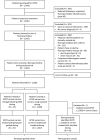Impact of pretreatment dihydropyrimidine dehydrogenase genotype-guided fluoropyrimidine dosing on chemotherapy associated adverse events
- PMID: 33620159
- PMCID: PMC8301551
- DOI: 10.1111/cts.12981
Impact of pretreatment dihydropyrimidine dehydrogenase genotype-guided fluoropyrimidine dosing on chemotherapy associated adverse events
Abstract
Consensus guidelines exist for genotype-guided fluoropyrimidine dosing based on variation in the gene dihydropyrimidine dehydrogenase (DPYD). However, these guidelines have not been widely implemented in North America and most studies of pretreatment DPYD screening have been conducted in Europe. Given regional differences in treatment practices and rates of adverse events (AEs), we investigated the impact of pretreatment DPYD genotyping on AEs in a Canadian context. Patients referred for DPYD genotyping prior to fluoropyrimidine treatment were enrolled from December 2013 through November 2019 and followed until completion of fluoropyrimidine treatment. Patients were genotyped for DPYD c.1905+1G>A, c.2846A>T, c.1679T>G, and c.1236G>A. Genotype-guided dosing recommendations were informed by Clinical Pharmacogenetics Implementation Consortium guidelines. The primary outcome was the proportion of patients who experienced a severe fluoropyrimidine-related AE (grade ≥3, Common Terminology Criteria for Adverse Events version 5.0). Secondary outcomes included early severe AEs, severe AEs by toxicity category, discontinuation of fluoropyrimidine treatment due to AEs, and fluoropyrimidine-related death. Among 1394 patients, mean (SD) age was 64 (12) years, 764 (54.8%) were men, and 47 (3.4%) were DPYD variant carriers treated with dose reduction. Eleven variant carriers (23%) and 418 (31.0%) noncarriers experienced a severe fluoropyrimidine-related AE (p = 0.265). Six carriers (15%) and 284 noncarriers (21.1%) experienced early severe fluoropyrimidine-related AEs (p = 0.167). DPYD variant carriers treated with genotype-guided dosing did not experience an increased risk for severe AEs. Our data support a role for DPYD genotyping in the use of fluoropyrimidines in North America.
© 2021 The Authors. Clinical and Translational Science published by Wiley Periodicals LLC on behalf of the American Society for Clinical Pharmacology and Therapeutics.
Conflict of interest statement
The authors declared no competing interests for this work.
Figures


Similar articles
-
DPYD genotype-guided dose individualisation of fluoropyrimidine therapy in patients with cancer: a prospective safety analysis.Lancet Oncol. 2018 Nov;19(11):1459-1467. doi: 10.1016/S1470-2045(18)30686-7. Epub 2018 Oct 19. Lancet Oncol. 2018. PMID: 30348537
-
Clinical Pharmacogenetics Implementation Consortium (CPIC) Guideline for Dihydropyrimidine Dehydrogenase Genotype and Fluoropyrimidine Dosing: 2017 Update.Clin Pharmacol Ther. 2018 Feb;103(2):210-216. doi: 10.1002/cpt.911. Epub 2017 Nov 20. Clin Pharmacol Ther. 2018. PMID: 29152729 Free PMC article.
-
Clinical relevance of DPYD variants c.1679T>G, c.1236G>A/HapB3, and c.1601G>A as predictors of severe fluoropyrimidine-associated toxicity: a systematic review and meta-analysis of individual patient data.Lancet Oncol. 2015 Dec;16(16):1639-50. doi: 10.1016/S1470-2045(15)00286-7. Epub 2015 Oct 23. Lancet Oncol. 2015. PMID: 26603945
-
The Prevalence of DPYD*9A(c.85T>C) Genotype and the Genotype-Phenotype Correlation in Patients with Gastrointestinal Malignancies Treated With Fluoropyrimidines: Updated Analysis.Clin Colorectal Cancer. 2019 Sep;18(3):e280-e286. doi: 10.1016/j.clcc.2019.04.005. Epub 2019 May 3. Clin Colorectal Cancer. 2019. PMID: 31160238
-
Standard fluoropyrimidine dosages in chemoradiation therapy result in an increased risk of severe toxicity in DPYD variant allele carriers.Eur J Cancer. 2018 Nov;104:210-218. doi: 10.1016/j.ejca.2018.07.138. Epub 2018 Oct 23. Eur J Cancer. 2018. PMID: 30361102
Cited by
-
Unveiling the heritability of selected unexplored pharmacogenetic markers in the Saudi population.Front Pharmacol. 2025 May 1;16:1559399. doi: 10.3389/fphar.2025.1559399. eCollection 2025. Front Pharmacol. 2025. PMID: 40376268 Free PMC article.
-
Pharmacogenetic Practice of Anticancer Drugs: Multiple Approaches for an Accurate and Comprehensive Genotyping.Pharmgenomics Pers Med. 2023 Jul 27;16:739-746. doi: 10.2147/PGPM.S412430. eCollection 2023. Pharmgenomics Pers Med. 2023. PMID: 37534027 Free PMC article.
-
Genetic Variation in miR-27a Is Associated with Fluoropyrimidine-Associated Toxicity in Patients with Dihydropyrimidine Dehydrogenase Variants after Genotype-Guided Dose Reduction.Int J Mol Sci. 2023 Aug 27;24(17):13284. doi: 10.3390/ijms241713284. Int J Mol Sci. 2023. PMID: 37686089 Free PMC article.
-
Fluoropyrimidine usage in cases with hyperammonemia: real-world data study using the Japanese Adverse Drug Event Report (JADER) database.Cancer Chemother Pharmacol. 2023 Jul;92(1):7-14. doi: 10.1007/s00280-023-04542-7. Epub 2023 May 19. Cancer Chemother Pharmacol. 2023. PMID: 37204512
-
Integrating rare genetic variants into DPYD pharmacogenetic testing may help preventing fluoropyrimidine-induced toxicity.Pharmacogenomics J. 2024 Jan 12;24(1):1. doi: 10.1038/s41397-023-00322-x. Pharmacogenomics J. 2024. PMID: 38216550 Free PMC article.
References
-
- Hoffman‐La Roche Ltd. Xeloda (Capecitabine) Product Monograph. (2019). <https://pdf.hres.ca/dpd_pm/00051991.PDF>.
-
- Hoffman‐La Rocher Ltd . Xeloda (Capecitabine) Package Insert. (2019). <https://www.accessdata.fda.gov/drugsatfda_docs/label/2015/020896s037lbl.pdf>.
-
- Sandoz Canada Inc. Fluorouracil Injection Product Monograph. (2012). <https://pdf.hres.ca/dpd_pm/00016156.PDF>.
-
- Spectrum Pharmaceuticals , Fluorouracil Package Insert. (2016). <https://www.accessdata.fda.gov/drugsatfda_docs/label/2016/012209s040lbl.pdf>.
-
- Mikhail SE, Sun JF, Marshall JL. Safety of capecitabine: a review. Expert Opin Drug Saf. 2010;9:831‐841. - PubMed
Publication types
MeSH terms
Substances
LinkOut - more resources
Full Text Sources
Other Literature Sources
Medical

